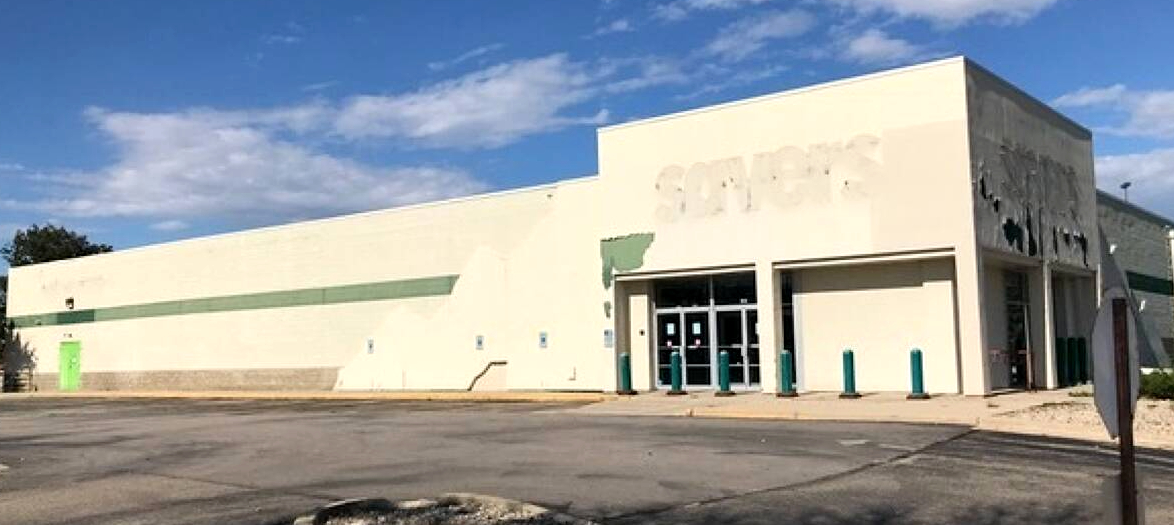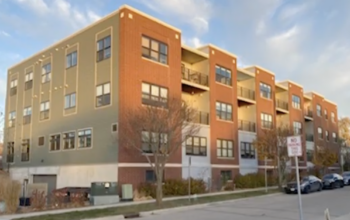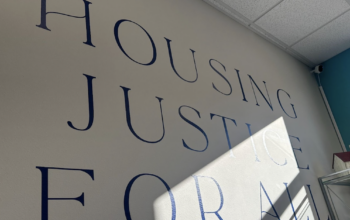The Madison Common Council failed to pass a proposal to purchase a site near East Towne Mall for Porchlight’s permanent men’s homeless shelter early Wednesday morning.
Council President Syed Abbas moved to delay the decision until the August 3 Common Council Meeting to take time to consider the Hoover Corporation property on Pennsylvania Avenue, which he said would be preferable as it is closer to other homeless services and downtown Madison. The Council voted against the delay, and against adopting the proposal with a vote of 14 for and 5 against—one vote short of the 15 votes needed to pass the budget amendment required to purchase the property.
The building, a former retail space located at 2002 Zeier Road, would have been converted into an overnight shelter to house up to 250 guests per night by the end of 2022. The acquisition would cost $2.7 million with a total cost of $10.5 million for the project. The proposal was initially brought to a vote on March 30 but was postponed until May 4 after the aldermanic elections. The temporary shelter is currently located at the City Fleet Services Building on First Street.
The proposal to convert the Zeier Road property into a men’s shelter was met with resistance from business owners in the neighborhood, who said they supported the idea of a permanent men’s shelter but voiced concerns about the effects on their businesses. Before the vote, Karla Thennes, Executive Director of Porchlight, responded to concerns.
“People aren't just languishing about. They're utilizing the services that we're providing to them and then they're leaving. That's what's happening now, that's what was happening for forty years,” Thennes said.
Thennes pointed out that when Porchlight had a shelter near the capitol, there were almost no grievances from neighbors.
“I could count on literally one hand the number of times I got a complaint from a neighbor,” Thennes said.
For 35 years, Porchlight used the basement of Grace Episcopal Church and the basements of St. John’s Lutheran Church and First United Methodist Church as overflow shelters. However, the church spaces were insufficient. When the pandemic struck, Porchlight had to move to Warner Park Community Recreation Center to accommodate for social distancing. The shelter moved to Fleet Services, the future site of the Madison Public Market, in December of last year. The pandemic made the need for a permanent men’s shelter clearer than ever—but disagreements over location have stalled progress.
In response to negative reactions to the shelter’s possible location, Thennes stressed the urgency of finding a permanent shelter for homeless men in Madison.
“I understand, but I have one hundred to two hundred men every night who don't have a place to live. So we can all complain about not wanting to be by the shelter and go home to our nice warm house, or we can try to figure this out,” Thennes said.
The pandemic has brought the issue of homelessness into the spotlight. A federal eviction moratorium was instituted in the beginning and has been extended to relieve eligible people from the economic stress of paying rent considering loss of employment related to the virus.
CARES Act funds have been used to cover hotel stays for homeless men 65 and older and those who are symptomatic or test positive for coronavirus. The Salvation Army moved families into hotels early on to accommodate for social distancing.
The pandemic poses many challenges for the homeless and housing insecure in Madison. Porchlight will have to leave the Fleet Street location in fall of 2022, when construction will begin for the Madison Public Market, and there have been continuous delays on finding a permanent men’s shelter.
Dominique Christian is the Housing Program Manager at The Road Home, an organization that helps families in Dane County find and maintain stable housing. She says that the situation for families facing homelessness has changed for the worse, especially considering racial inequalities in housing.
“While rent balances are continuously growing, access to employment has not really changed. So, you know, companies are still shut down or operating with limited hours, which means that they’re not employing or they're not employing to full capacity because there's no need for it,” Christian said.
The moratorium is a significant relief to renters in times of economic hardship, but it is still difficult for many people to find enough work to pay rent. Rent payments have been delayed, not eliminated, so renters will still be required to pay once the moratorium is lifted.
“We still have to be concerned about the landlords that will do a non-renewal of the lease or will not rent to someone because they weren't able to pay their rent timely,” Christian said.
Christian noted the problem of racial inequality among the homeless population. As of 2018, Black people made up 48 percent of the homeless population in Dane County, but only five percent of the general population.
Christian spoke to the challenges that the Black homeless population will face post-moratorium.
“Black people are stigmatized and frowned upon just based off our skin color alone. Then when you take the idea of no employment for over a year, you take the idea of non-payment of rent in a timely fashion over a year, and then you take this idea of what homelessness looks like, as opposed to diving deeper and considering the systems to which we are required to operate within, you will have absolute chaos once the moratorium let's up,” Christian said.
When asked if she felt that the pandemic had drawn attention to the issue of homelessness, Christian said yes.
“I think that it has absolutely drawn attention to it, but I think that it's also sort of debunked the myth that we cannot eliminate homelessness within the United States--we absolutely can,” she said.





